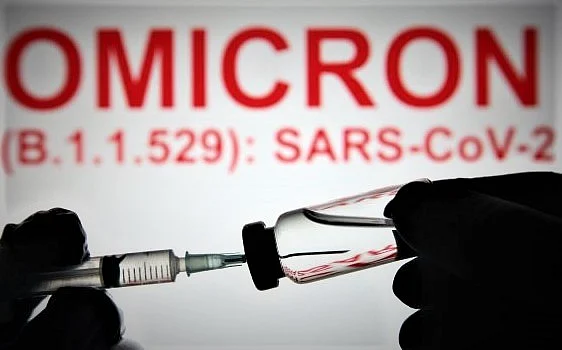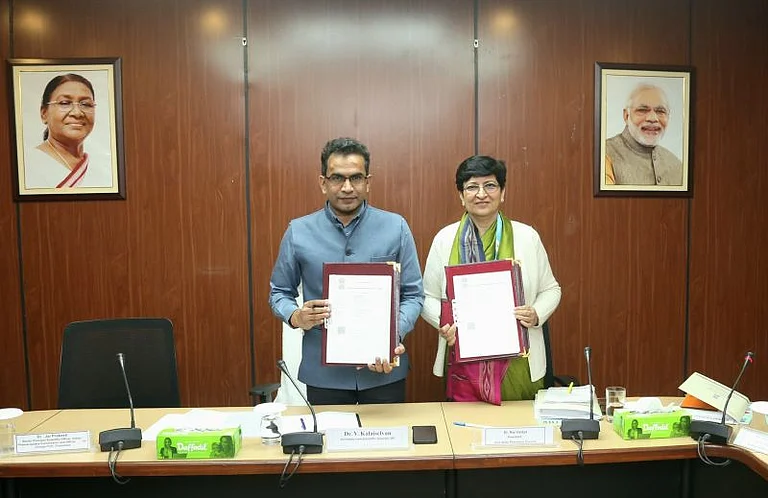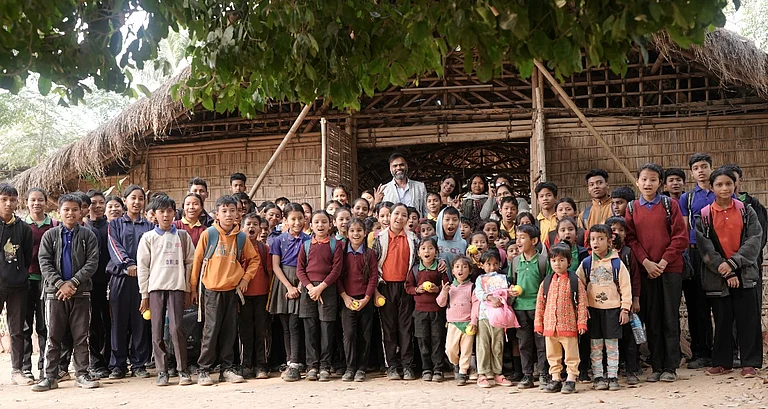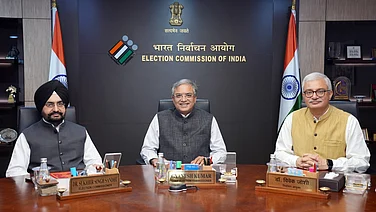The emergence of the Omicron variant of Covid-19 has led to serious concerns among governments and epidemiologists across the world. According to the World Health Organisation, Omicron is a highly transmissible variant - more transmissible than the formerly discovered Delta variant. WHO also said on Sunday that despite the higher transmissibility, the Omicron variant caused "milder" symptoms in those testing positive for it. However, one of the most striking findings made by WHO is its impact on vaccine efficacy.
The apex health body has said that while Omicron symptoms are milder than Delta, it may reduce the efficacy of existing vaccines. In an official brief, WHO said that the Omicron variant causes "a reduction in vaccine efficacy against infection and transmission".
Even as research regarding the transmissibility and severity of the new variant continues, there has been a growing chorus for booster shots. Nations like the United Kingdom are now advocating booster shots to increase vaccine efficacy against Omicron.
The Indian government is also considering booster shots. The government informed Lok Sabha last week that the National Technical Advisory Group on Immunisation (NTAGI) and National Expert Group on Vaccine Administration for Covid-19 (NEGVAC) were carrying out studies and considering scientific evidence vis-a-vis booster shots.
Does this mean the current Covid-19 vaccinations are not adequate to protect Omicron? The question has given rise to a debate regarding the future course of India's vaccine strategy and priorities.
Does Omicron reduce vaccine efficacy?
That depends on how one defines 'protection' and 'efficacy', says eminent virologist Shahid Jameel. The former head of the scientific advisory group to the Indian SARS-CoV-2 Genomics Consortia (INSACOG) said that vaccines do not protect very well from re-infection by Omicron but they continue to protect from severe disease.
When a vaccine is given to any community, there Is always an expectation of 70 per cent efficacy. Meaning, if 1,000 people are vaccinated, the risk is reduced for all 1,000 people by 70 per cent.
This new variant however has the ability to transmit faster, and it has also been seen to evade the immunity given by existing vaccines. That is why it has been named a variant of concern by the WHO, points out Dr Jugal Kishore, Director Professor & Head of Community Medicine at Vardhman Mahavir Medical College & Safdarjung Hospital. He adds that there is a strong possibility that the new variant will affect persons who are already immune to previous variants. "That’s the basic nature of a variant of concern or a breakthrough infection," Kishore added.
However, vaccine efficacy includes protection not just against infection but also severe disease hospitalisation and death. In early data from United Kingdom, Omicron reduces vaccine efficacy against symptomatic infection by a lot. Whether it will also reduce efficacy against severe disease is unknown but expected to be much smaller.
Do boosters increase protection against Omicron?
The UK Health Security Agency (UKHSA) recently said that a third booster dose of the Covid-19 vaccine may provide 70-75 per cent protection against symptomatic infection from the Omicron variant.
According to Jameel, boosters increase the number of antibodies circulating in the body. By that logic, a booster dose of the vaccine may help fight Omicron better by preventing more severe symptomatic infections. However, it does not produce different kinds of antibodies.
"Two doses of AZ or Pfizer vaccines plus one booster of Pfizer vaccine is reported to offer about 75 per cent protection from re-infection. More studies with different vaccines are needed. It should also be understood that antibodies wane with time after the vaccine dose. However, immune memory remains and is resourced quickly on infection to protect," Jameel said.
All India Director at CSIR Institute Of Genomics and Integrative Biology Anurag Agrawal agreed that boosters may provide a better chance against Omicron. "We have seen that vaccine efficacy against severe disease went down to 70-80 per cent during the Delta wave for healthcare workers. We know that in previously uninfected people, the third dose of Covishield leads to about double the response of two doses. There are useful models from a meta-analysis of trials that suggest that such a doubling of immune response will lead to 10-15 per cent increase in efficacy," Agrawal tells Outlook.
To understand if boosters are important, one must first be clear on the definition of "booster". A booster dose is what is given after giving priming dose(s). Pfizer, for instance, has two priming doses given 3 weeks apart. "When we say "third dose", if given one month later, it is not a booster, but extended priming. Booster dose has to be at or after 6 months and the booster response will be 30-40 times higher antibody response -- thus correcting for loss of effectiveness," virologist T Jacob John told Outlook.
"That is why we think booster dose will enhance protection from infection, which in turn will retard transmission and infection burden," the former head of ICMR's Centre of Advanced Research in Virology said.
But in a county where just 58 per cent of all Indians are vaccinated with one dose and about 37 per cent with 2 doses, the important question is - what should the government prioritise?
Coverage vs boosters
Experts agree that despite the apparent benefits of boosters, Indian vaccine policy needed to continue focusing on increasing coverage, i.e, ensuring first and second doses for 100 per cent of its population.
"We must give two doses on priority to people who have one or zero dose of vaccine," Kishore said.
Jameel as well as Agrawal suggested reducing the gap between two Covishield doses to increase vaccination. "Since Covishield has been used for 90% of doses in India, the gap between the two doses can safely be reduced from 12-16 weeks to 8-12 weeks. If there is no vaccine shortage, this should speed up vaccination and improve protection," Jameel said.
T Jacob John, however, cautioned against trying to fix something that isn't broken. "Don't confuse people by unnecessary changes in schedule. Moreover, it is well known that larger the gap ( such as 8 weeks or 10 or 12 weeks), the better the response to the priming schedule".
Jacob also stressed that pitting vaccination coverage against boosters was not a good idea. "Even policymakers are asking if they should prioritise vaccine coverage or boosters. But I feel it is a wrong question. There are four avenues India must progress: One, provide dose to all eligible but not yet vaccinated. Two, second dose to all who failed to take it. Three, boosters to all who got the second dose 6 or more months earlier". The fourth avenue, John said, was to start looking at vaccinations for children.
"Omicron may affect youngsters more frequently and they need protection, especially as schools are opening," John said.
Finding the right booster
Kishore cautions that even though boosters may help, finding the right booster combination was key. Omicron is the result of a mutation in the spike protein of Covid-19. Most vaccines available in India except Covaxin are developed according to the surface antigen or the spike protein. These are called adenovirus-based vaccines.
"Now if the spike protein changes, how can a vaccine designed for another type of spike protein prevent a new variant?" Kishore asked.
Serum Institute’s Covishield (Oxford-AstraZeneca) and Russia’s Sputnik V are adenovirus-based vaccines, also known as ‘vector virus’ vaccines. In the UK, AZ has shown lower efficacy against Omicron infections.
However, Bharat Biotech’s Covaxin is an inactivated whole virus vaccine. Does that fend better against Omicron? Agrawal, who is the present Director of INSACOG, does not think so.
"The very low observed effectiveness against symptomatic disease for 2 doses of AZ/Covishield is concerning. UK does not use Covaxin so no actual data. However, since ICMR-AIIMS studies during the second wave (Delta) did not find any advantage of whole virion vaccines like Covaxin, over spike vaccines like Covishield, the safest assumption is that there will be a similar reduction in effectiveness for Covaxin as well".
Experts like John, however, feel that virion vaccines like Covaxin might be the best choice for a booster.
"In my opinion," says John, "Covishield-Covishield and Covaxin booster and, Covaxin-Covaxin and Covaxin booster would work best". He explains why: "Covaxin has more antigens than Covishield but for Spike protein, Covishield is more potent than Covaxin. So Covaxin as a booster broadens immunity plus Covaxin seems to be (as far as I know) the safest vaccine around -- safer than Pfizer, Moderna, Astra Zeneca which is Covishield in India.
The boosters that are most popularly given globally are 2 RNA vaccines + RNA booster and 2 AZ vaccine + RNA booster.
According to a report in The Indian Express, however, top officials at the National Technical Advisory Group on Immunisation (NTAGI) that is providing guidance to the government on vaccinations have a consensus on not using three shots of the same vaccine as a booster.
In this regard, Jameel points out that Covishield and Covaxin may not be the only two options.
"India should push forward with the approval of two protein vaccines produced locally - Covovax by SII and Corbevax-E by Biologicals E. These have completed phase 3 trial in India and are likely to be effective. ZyCoV-D can also be used as boosters and the government must ensure enough doses of the DNA vaccine," Jameel said.
What route the Indian vaccine policy on Omicron takes remains to be seen. However, the fact that a majority of Indians already have natural immunity from natural infections might be heartening.
Can Hybrid Immunity be the answer?
Hybrid immunity may also play an important part in determining the need for boosters. Hybrid immunity refers to immunity from a prior infection plus vaccination. "By all available data, infection followed by vaccination is much more effective in giving higher and better quality immune response. How effective it will be against Omicron is unclear but neutralization data was excellent for infection + 2 doses of mRNA vaccines. It should thus be very effective against severe disease, and hopefully also effective in preventing infections," says Agrawal.
The second wave infected a huge number of Indians, estimated at around 920-940 million as per the 4th National Sero Survey in July 2021. A subset of these people have by now received one or two doses. Jameel points out that this section should have sufficient protection from severe disease but not from symptomatic infection. "India has to decide what it will consider acceptable by way of policy," Jameel said.
T Jacob John, however, says that the hybrid immunity acquired after infection and two doses may not be enough and that a booster shot will help strengthen hybrid immunity.
"Infection immunity is higher than two-dose immunity, but neither is showing high effectiveness against Omicron infection (as re-infection or break-through infection). Booster dose immunity will be far higher than infection immunity. "Hybrid" immunity with booster will be even higher," John said.


























